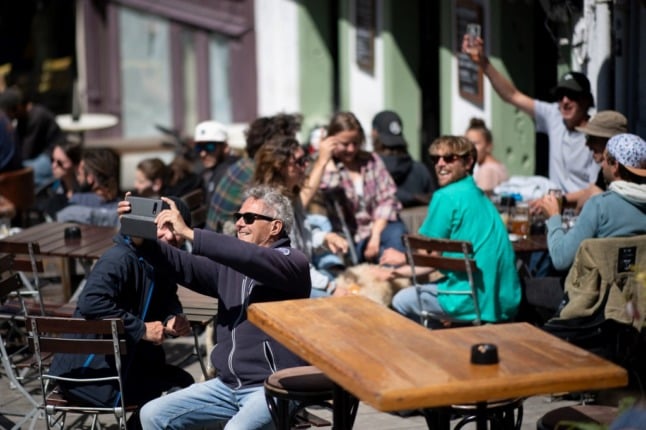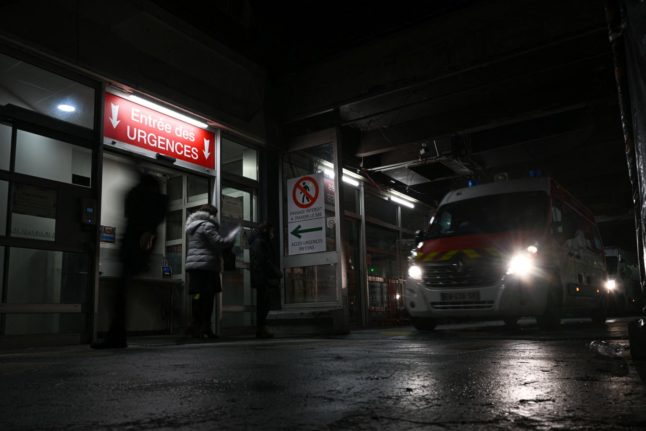Wednesday marks phase 3 of France’s reopening plans, with bars, restaurants and cafés allowed to open their indoor spaces while gyms and swimming pools could also reopen.
READ ALSO What changes in France on Wednesday?
Rules for travellers from within the EU were also eased, while vaccinated travellers were allowed in again from non-EU countries including the UK, USA and Canada under the traffic light system.
EXPLAINED How France’s traffic light travel system works
The return of simple joys was welcome for some.
“It’s a pleasure to have a coffee inside. Normal life is gradually resuming,” said transport employee Hammou Mraoui, sipping a coffee in a bar in the Meudon suburb of Paris.
Bar owner Christophe Guedes said it was an adjustment to serve indoors again.
“It’s almost strange to hear a client say ‘a coffee inside please’, but it’s a huge relief,” he told AFP.
The overnight curfew will now start later – at 11pm instead of 9pm – before being dropped entirely on June 30th if the health situation permits.
The new measures also mean that spectators will be able to enjoy night sessions for the final stages of the French Open tennis in Paris.
Some fitness buffs were happy to finally be allowed inside again, including Stephanie Moscoso, who hit her local gym in central Paris at 8am.
“I was super motivated. I put on the alarm clock this morning, it was super early, I saw the sun, I said to myself: this is the beginning of a new life!” the 35-year-old said.
One sector still lacking clarity is night clubs, which remain closed until further notice, with the government set to look at the situation again on June 21st.
And in virtually all of France, masks remain obligatory even out of doors until further notice.
The new openings come as France – one of Europe’s hardest hit countries – sees a sharp drop-off of coronavirus cases after a grim winter.
Weekly French Covid thread
The pandemic is now melting rapidly in France. The average number of cases is 6,109 a day (compared to 40,000 in April). The nationwide incidence rate is 68.6 – only just above the alert threshold of 50 (cases per 100,000 people/7days).
BUT…
1/10 pic.twitter.com/zofQHqet9X— John Lichfield (@john_lichfield) June 9, 2021
The numbers in intensive care are down to 2,394 compared with 6,000 in late April.
And as of Tuesday more than 28 million people had at least one vaccine shot – about 55 percent of the adult population.
A very scientific straw poll conducted at my hairdresser last week showed 8 people who looked roughly 40 or under had all been 1st jabbed, 1 2nd jabbed and rest had RVs for late June or July.
🇨🇵 really is vaccinating and reopening 🎉🥂 https://t.co/Mgf6Vyr505— Emma Pearson (@LocalFR_Emma) June 9, 2021
The government is on course to reach its target of 30 million people with at least one dose of the vaccine by June 15th.
President Emmanuel Macron urged caution with the reopenings, while embracing a return to normal.
Demain, une nouvelle étape sera franchie. Ici, dans un lycée hôtelier de la Drôme, comme partout en France, je mesure combien c’est attendu. C’est la vie qui va reprendre sur tous nos territoires ! C’est une part de notre culture, de notre art de vivre, que nous allons retrouver. pic.twitter.com/Q5P5rN32m1
— Emmanuel Macron (@EmmanuelMacron) June 8, 2021
“A new step will be taken” on Wednesday, President Emmanuel Macron wrote on Twitter.
“Life will resume across our country. It is part of our culture, of our art of living, that we are going to reacquaint ourselves with,” he said.



 Please whitelist us to continue reading.
Please whitelist us to continue reading.
Member comments